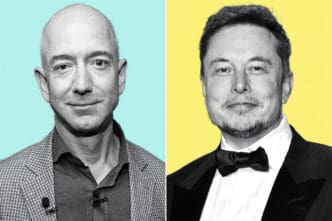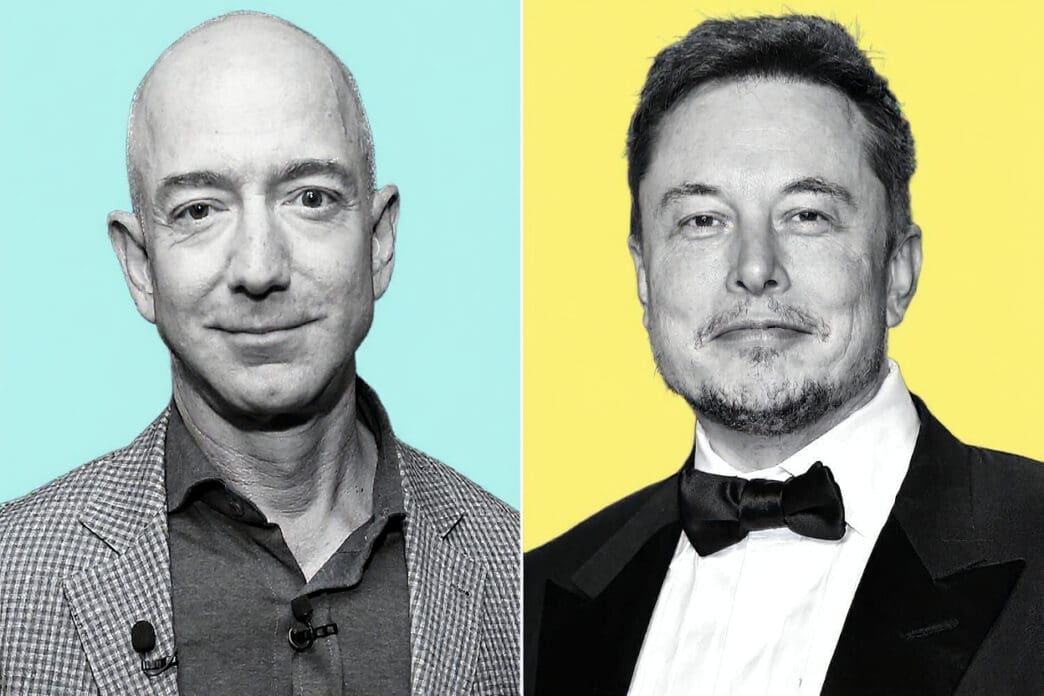In the grand theater of modern business and technology, no rivalry is more consequential or captivating than the one between Elon Musk and Jeff Bezos. These two titans, who have repeatedly traded the title of the world’s wealthiest person, are locked in a multi-front competition that extends from the depths of Earth’s commerce to the vastness of outer space. Their contest, which has simmered for over two decades, is primarily fought through their flagship aerospace companies—Musk’s SpaceX and Bezos’s Blue Origin—but also spills into electric vehicles, artificial intelligence, and the global media landscape. At its core, this is not merely a battle for market share or net worth; it is a profound clash of personalities, strategies, and competing visions for the very future of humanity.
The Genesis of a Rivalry: A Tale of Two Visions
The stories of both men begin in the fertile ground of the 1990s internet boom. Jeff Bezos, a Princeton graduate who left a lucrative Wall Street job, founded Amazon in his garage in 1994, meticulously building an e-commerce empire on the philosophy of customer obsession and long-term thinking. His approach was methodical, data-driven, and relentlessly focused on dominating one sector before expanding to the next.
Elon Musk, a physicist and economics graduate, took a different path. After co-founding and selling the web software company Zip2, he poured his earnings into what would become PayPal. Following PayPal’s sale to eBay, Musk embarked on a seemingly impossible quest to simultaneously disrupt three entrenched industries: space with SpaceX (2002), automotive with Tesla (joining in 2004), and energy with SolarCity (founded by his cousins in 2006, later acquired by Tesla).
For years, their paths ran parallel, with Bezos consolidating his terrestrial empire while Musk waged high-risk battles against legacy giants. The true intersection of their ambitions, and the spark that ignited their direct rivalry, was their shared, lifelong fascination with space. It was here, in the cosmos, that their two vastly different approaches to building the future would collide head-on.
The Final Frontier: SpaceX vs. Blue Origin
The competition between SpaceX and Blue Origin represents the most visible and visceral front of the Musk-Bezos conflict. While both aim to lower the cost of access to space, their philosophies, timelines, and ultimate goals diverge dramatically, creating a perfect storm for corporate and personal conflict.
Founding Philosophies
Jeff Bezos founded Blue Origin in 2000, two years before SpaceX, with the Latin motto “Gradatim Ferociter”—Step by Step, Ferociously. This captures his strategy perfectly: a slow, deliberate, and secretive approach to developing space technology. Blue Origin focused first on mastering suborbital flight with its New Shepard rocket, intended for space tourism, before moving on to its larger, orbital-class rocket, New Glenn.
Bezos’s long-term vision is to see millions of people living and working in space, not on other planets, but in massive, manufactured space colonies. He believes this will allow Earth to be preserved as a pristine residential and light-industrial zone, while heavy industry is moved off-world. It’s a vision of protecting Earth by expanding into its cosmic backyard.
Musk, conversely, founded SpaceX with a singular, audacious goal: making humanity a multi-planetary species to ensure the long-term survival of consciousness. His focus has always been on Mars. This grand objective required a radically different approach—one of rapid iteration, public testing, and embracing spectacular failures as learning opportunities. SpaceX’s “move fast and break things” ethos stands in stark contrast to Blue Origin’s cautious crawl.
The Battle for Contracts and Supremacy
For years, the philosophical differences played out behind the scenes. The rivalry became public and heated when valuable government contracts were on the line. SpaceX quickly established itself as a reliable partner for NASA, first delivering cargo to the International Space Station (ISS) and later becoming the first private company to launch astronauts to the ISS from American soil since the Space Shuttle’s retirement.
The most significant flashpoint came in 2021 when NASA awarded SpaceX a sole-source, $2.9 billion contract to develop the Human Landing System (HLS) for the Artemis program, which aims to return astronauts to the Moon. Blue Origin, which had led a “National Team” including legacy aerospace giants, was a losing bidder. What followed was a bitter and public feud.
Bezos’s company filed a formal protest with the Government Accountability Office and later sued NASA in federal court, alleging the agency had improperly evaluated the bids. The legal challenges ultimately failed, but they delayed the contract’s start and drew sharp, public ridicule from Musk, who repeatedly used his platform on X (then Twitter) to mock Blue Origin’s lack of orbital flight experience and its “lawyers, not rockets” strategy.
This conflict highlighted a key technological gap. By that time, SpaceX had not only flown dozens of its reusable Falcon 9 rockets to orbit but had also mastered the art of landing and reflying its first-stage boosters, drastically cutting launch costs. Blue Origin had only achieved suborbital flights, and its orbital New Glenn rocket remained years from its first launch.
Beyond the Stars: Earthly Dominions
While the space race captures the headlines, the rivalry extends to several key terrestrial sectors where their business interests overlap, often pitting Musk’s disruptive product focus against Bezos’s logistical and platform-based dominance.
The Electric Vehicle Arena
Tesla is the undisputed global leader in electric vehicles, a company Musk has built into a trillion-dollar valuation by revolutionizing the automotive industry. Bezos has not challenged Tesla directly, but he has made a significant strategic move in the EV space. In 2019, Amazon led a $700 million investment round in EV startup Rivian.
More importantly, Amazon placed an order for 100,000 custom-built electric delivery vans from Rivian, one of the largest EV orders in history. This move serves two purposes for Bezos: it helps Amazon achieve its climate goals by electrifying its massive delivery fleet, and it props up a viable competitor to Tesla in the commercial and consumer EV markets. It’s a classic Bezos play: using his primary platform’s scale to influence an adjacent industry.
Artificial Intelligence and Cloud Computing
The battle for the future of artificial intelligence is another key front. Here, Bezos has a massive incumbent advantage. Amazon Web Services (AWS) is the world’s dominant cloud computing platform, providing the foundational infrastructure upon which thousands of companies, including many AI startups, are built. AWS offers a suite of powerful AI and machine learning tools, making it a central player in the AI revolution.
Musk is a challenger in this domain. He was a co-founder of OpenAI, the creator of ChatGPT, but left the organization over philosophical differences. He has since launched his own company, xAI, with the stated goal of creating an AI “to understand the true nature of the universe.” This venture directly competes with AI labs like Google’s DeepMind and the Microsoft-backed OpenAI, which all rely heavily on cloud infrastructure dominated by AWS.
Media and Public Influence
Both men also wield immense influence through their ownership of major media platforms. In 2013, Bezos purchased The Washington Post, a legacy institution of American journalism. He has largely maintained a hands-off approach, allowing the newsroom to operate with editorial independence while providing the financial stability it needed to thrive in the digital age.
Musk’s 2022 acquisition of Twitter, which he renamed X, was a far more dramatic and hands-on affair. He has actively reshaped the platform into what he calls a “global town square” dedicated to free speech, personally engaging in content moderation debates and using his own account to shape narratives and attack critics. Their contrasting ownership styles reflect their broader personalities: Bezos the quiet, institutional custodian, and Musk the loud, disruptive provocateur.
Clash of Titans: Contrasting Styles and Fortunes
Underpinning the entire rivalry is a fundamental difference in leadership style and personal ambition. Musk is the quintessential wartime CEO, a micromanager deeply involved in the engineering details, known for setting impossible deadlines and pushing his teams with relentless intensity. His public persona is volatile, meme-loving, and unfiltered.
Bezos is the systematic, long-term architect. He is known for creating institutional processes, like his “two-pizza teams” and “Day 1” philosophy, that allow his vision to scale. He is more reserved publicly, communicating through carefully crafted annual shareholder letters and interviews. While both are fiercely competitive, Musk’s style is one of public confrontation, whereas Bezos prefers to let his company’s results do the talking.
Their immense fortunes, which fluctuate with the stock prices of Tesla and Amazon, have become a public scorecard for their success. Yet for both, the wealth seems to be a tool rather than the end goal—a source of capital to fund their world-changing, and often competing, ambitions.
Conclusion: A Rivalry That Defines an Era
The competition between Elon Musk and Jeff Bezos is far more than a simple business dispute or a clash of egos. It is a generational rivalry that is actively shaping the course of technology, exploration, and human civilization. From the rockets that will carry us to the Moon and Mars, to the electric vehicles that power our cities, to the digital platforms where we debate our future, their influence is inescapable. The friction between Musk’s breakneck race to Mars and Bezos’s methodical plan to preserve Earth creates a dynamic tension that accelerates innovation for everyone, ensuring that no matter which vision ultimately prevails, humanity will be pushed further and faster into the future.








